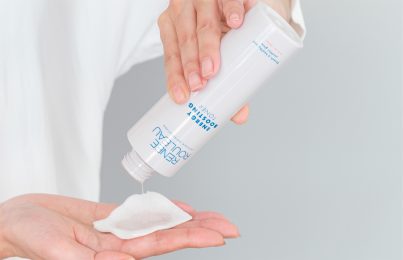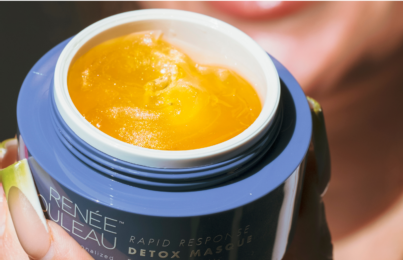Updated 06/24/25. Now that it’s summer, many of us are spending time at the beach and swimming in the ocean. So, it’s time to talk about how that affects your skin. More specifically, it’s time to talk about how salt water affects your skin. There’s a lot of speculation about this online. People wonder, is salt water good for your skin? Does it dry it out? Is it better for some skin types over others? In this post, I’ll discuss all of the ways salt water can affect your skin (including all the ways it can benefit it!).
Is Salt Water Good or Bad for Your Skin?
This might surprise some of you, but for the most part, I believe salt water can be beneficial to the skin. Yes, really! It can even help alleviate certain skin conditions. That’s because seawater contains a variety of vitamins, minerals, and amino acids, including magnesium, potassium, and sulfur. The therapeutic effects of these minerals have been widely recognized since the time of Ancient Greece, which was when Herodotus and Hippocrates proclaimed the curative powers of bathing in natural hot springs. This formed the basis for balneotherapy, which is still widely practiced, from Calistoga, California to the Blue Lagoon of Iceland.
Thalassotherapy is similar to balneotherapy. It’s the use of seawater as a form of therapy to restore and remineralize the body. Spas, especially those located along the coast of France (in Brittany), have special marine pools that utilize this super-charged mineral water. It’s not just practiced in France, either. Just think about all the people who travel to the Dead Sea every year to bathe in its water for potential healing benefits! It looks incredible.
What’s interesting is that seawater and blood plasma have a nearly identical chemical composition in terms of mineral and trace element levels. In fact, seawater is so similar to the body’s internal environment that if white blood cells are removed from the body and placed in a sterile diluted seawater solution, they can maintain normal cell function. This is the only solvent that will accommodate continual cellular activity. How incredible is that?
3 Ways Salt Water Can Benefit the Skin
1. Salt Water Can Be Beneficial for Blemishes
Salt water has natural antiseptic drying agents (such as sulfur) that are commonly used in blemish-fighting products. That explains why a swim in the ocean could be potentially beneficial for existing breakouts. Of course, you should always wear sunscreen to protect your skin from sun damage, so don’t jump in the water without applying a well-formulated SPF.
With that being said, UV light can also help destroy bacteria. So, the combination of sun and salt water could potentially improve blemishes. This is especially true for people with back breakouts, who find it difficult to reach and thus properly treat that area.
2. Salt Water Can Be Beneficial for Wounds
Many people find ocean water to be beneficial for helping heal cuts and open skin (like blemishes).
3. Salt Water Might Improve Conditions Like Eczema and Psoriasis
Many people find an improvement in red, irritated skin conditions like eczema and psoriasis from salt water, thanks to the drying effect of the sodium in it. When it comes to psoriasis specifically, which is a skin condition characterized by redness and irritation, the addition of UV light from the sun can help greatly.
While beneficial in certain cases, the drying effect of salt water isn’t always helpful for people with dry skin types. So, if you’re someone who has dry skin, you need to know how to care for your skin post-swim. Luckily, I have some tips for that.
How to Defend Your Skin Against Dryness When Swimming in Salt Water
Ocean water has a high pH and can have a drying effect. While a minor drying effect may be beneficial for oily, blemish-prone skin, don’t overdo it. If you dry out your skin too much, it could cause even more irritation and inflammation, and that’s the last thing you want.
If you’re prone to dry skin, there are a few things you can do to mitigate dryness caused by salt water. The first thing you can do is apply water-resistant sunscreen before swimming. These sunscreens are typically formulated with heavier emollients. These emollients create a protective barrier over the skin that causes water to bead off instead of penetrating as deep into the skin as it normally would. This can prevent the salt water from disrupting the skin’s natural moisture barrier.
However, you should still wash your skin as soon as possible after you’re done swimming. That’s because salt doesn’t evaporate like water. If it’s still in contact with your skin, however slightly, it could still negatively impact your moisture levels. As always, once you’ve washed your skin with a gentle cleanser, you should apply a moisturizer that’s formulated for your skin type. This is the best bet for keeping your skin plump and hydrated.
How to Harness the Benefits of Seawater Without Swimming in the Ocean
An ongoing trend in skincare, which has been fueled by the green movement, is the concept of taking items found in nature (in this case that would be seawater) and using them topically on the skin in order to achieve a certain result. But using something in its natural, original, and unadulterated form isn’t always the best way to go.
It’s important to understand that even though ocean water contains enzymes, vitamins, minerals, and amino acids, you can only reap so many benefits when you use it in its natural form. Just like with anything else, it’s best to use stable, well-formulated products that contain effective ingredients. That way, you know they’ll be able to penetrate your skin and create positive change.
There is a term used by cosmetic scientists called “biomimicry.” It means using biotechnology to harness the best of a good thing and make it even better. Many elements and organisms found in seawater are used in skincare products, and they can be very beneficial. In fact, I use some sea-based ingredients in my own skincare line, including:
- Sulfur: This mineral is often used to address blemishes. You can find it in the Night Time Spot Lotion.
- Red Marine Algae: These algae are found along the shores of Hawaii. As a skincare ingredient, it can be very helpful for hydrating the skin and bolstering the natural moisture barrier. You can find it in the Hydraboost Rescue Creme.
- Chlorella Vulgaris Extract: This ingredient is a microalgae that may help increase collagen synthesis to encourage tissue regeneration. You can find it in the Firm + Repair Overnight Serum.
I hope you enjoyed learning about salt water and how it just might be affecting the skin.
Celebrity Esthetician & Skincare Expert
As an esthetician trained in cosmetic chemistry, Renée Rouleau has spent 35 years researching skin, educating her audience, and building an award-winning line of products. Her hands-on experience as an esthetician and trusted skin care expert has created a real-world solution — products that are formulated for nine different types of skin so your face will get exactly what it needs to look and feel its best. Trusted by celebrities, editors, bloggers, and skincare obsessives around the globe, her vast real-world knowledge and constant research are why Marie Claire calls her “the most passionate skin practitioner we know.”



